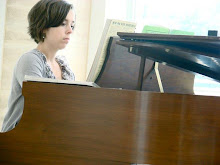Writing a post about the Schumann Fantasie is a bit more difficult for me than writing about the other Schumann pieces we have studied in piano lit. Part of the reason for this is that I am less familiar with it than I am with such pieces as Carnaval and Papillons, but also something about the Fantasie is inherently confusing to me. I just don't grasp it as easily as I do the others. I thought at first maybe this was due to a lack of continuity, but it is no more lacking than his other pieces. And he does achieve continuity through repetition, if nothing else (probably A-G-F-E-D, reference to Clara, too).
I think that there are certain qualities to the piece that make the Fantasie less tangible to me than others. While listening I subconsciously was thinking of it as a sonata and thought to myself, "Why did he not reverse movements 2 and 3?" Even though it is labeled as a fantasy, it does have some sonata-like characteristics (three movements, repeating themes and motives, etc.) Clearly the key areas could not have been switched since the 2nd movement is in Eb, but aside from that, the 2nd movement to me seems like a grand finale in the wrong place. I love the chordal theme of this movement - it is the Schumann whom we all know and love. The energy of this movement is appropriate to that of a finale, and the 3rd movement would serve well in the middle - a vocal melody with accompaniment.
After listening, I do not get the sense that this is a deep lament for Clara. For starters, it's in C major! Not exactly the key that I would have chosen as a lament. Clara's secret theme, though, is in D minor. Since Schumann intended to hide this reference to her, perhaps he also decided to mask his true feelings inside this minor motive within a major movement?
On a side note, Arnaldo Cohen's recording of this piece is awesome. It's so exciting, and I love how he is able to follow every single line. This piece is all about layering, textures, and counter-melodies, and Cohen brings out the different lines so beautifully. It's not over-done, if you know what I mean. Not too much attention to detail, but just enough so that the audience can notice all of the intricacies of the music.
I have come to love Schumann and want to play more of this music, but I think that I'll leave this one alone for a while.
Subscribe to:
Post Comments (Atom)

No comments:
Post a Comment